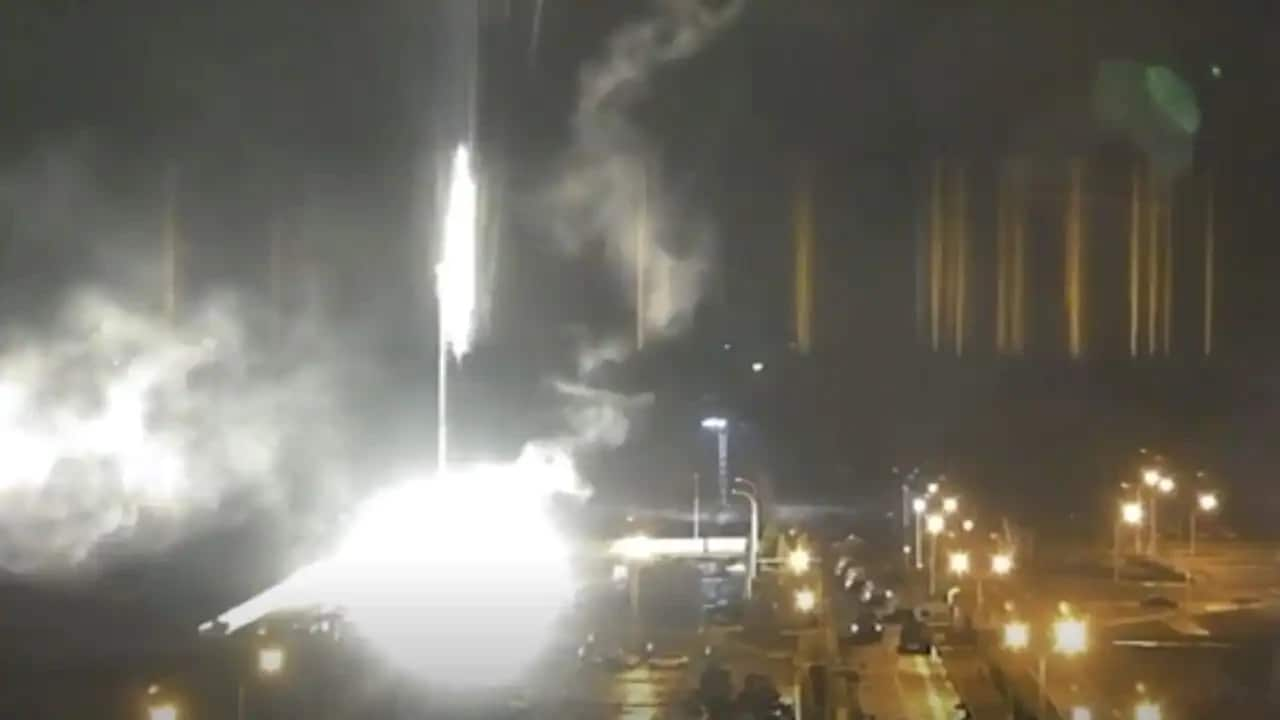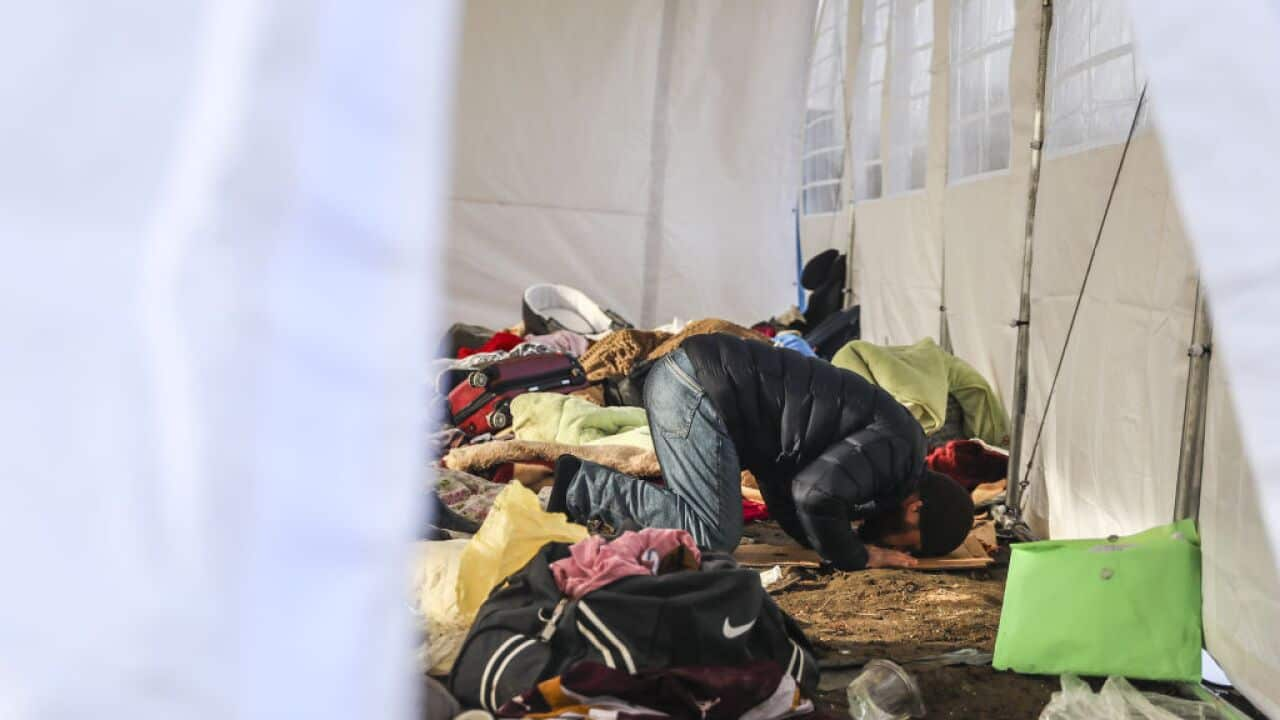Russian troops attacked Europe's largest nuclear plant on Friday, starting a fire at the Ukrainian facility, with the country's leader accusing Moscow of "nuclear terror".
Local authorities reported no immediate radiation rise was detected and "essential" equipment was unaffected by the fire, but it remained unclear what the invading forces planned next.
President Volodymr Zelenskyy accused Moscow of trying to "repeat" the Chernobyl nuclear disaster and said he had spoken with international leaders including US President Joe Biden and UK Prime Minister Boris Johnson about the crisis at the Zaporizhzhia nuclear plant.
Mr Biden urged Russia to allow emergency responders to go to the site.
A statement released by the British government said Mr Johnson was concerned Russia's actions "could now directly threaten the safety of all Europe".
Images on a live feed from the site earlier showed blasts lighting up the night sky and sending up plumes of smoke, with the International Atomic Energy Agency urging an immediate halt to fighting there.
"No country other than Russia has ever fired on nuclear power units," Mr Zelenskyy said in a video message.
"This is the first time in our history. In the history of mankind. The terrorist state now resorted to nuclear terror."

Destroyed cars are seen next to residential buildings damaged by heavy shelling in Irpin city, Ukraine, on 3 March 2022. Source: EPA, AAP / Roman Pilipey
"If there is an explosion, it is the end of everything. The end of Europe. This is the evacuation of Europe. Only immediate European action can stop Russian troops," he said.
But after several hours of uncertainty, Ukrainian authorities said the site had been secured and fire extinguished.
"The director of the plant said that the nuclear safety is now guaranteed," Oleksandr Starukh, head of the military administration of the Zaporizhzhia region, said on Facebook.
"According to those responsible for the plant, a training building and a laboratory were affected by the fire," he added.
The IAEA said it had been told by Ukraine's regulator that "there has been no change reported in radiation levels at the Zaporizhzhia Nuclear Power Plant site."
"Ukraine tells IAEA that fire at site of Zaporizhzhia Nuclear Power Plant has not affected 'essential' equipment, plant personnel taking mitigatory actions," the watchdog added in a tweet.
Russia has intensified strikes across the country eight days into the conflict, with fresh reports of civilian casualties and devastating damage, particularly in southern areas near the first city to fall to Moscow's troops.
In a second round of talks held Thursday, Moscow agreed to a Ukrainian request for humanitarian corridors to allow terrified residents to flee, but there was no immediate clarity on how they would work, and no sign of any move towards a ceasefire.
Mr Zelenskyy called for direct talks with Putin, but also urged the West to step up military assistance and "give me planes."
'Just like Leningrad'
The offensive has continued despite punishing international sanctions, and Mr Zelenskyy warned other former Soviet states were now at risk of Russian invasion.
"If we are no more then, God forbid, Latvia, Lithuania, Estonia will be next," he told a news conference, adding that direct talks with Mr Putin were "the only way to stop this war".
Much of the international community has rallied behind Ukraine since Mr Putin invaded on 24 February, making Russia a global outcast in the worlds of finance, diplomacy, sport and culture.
Western analysts say the invading forces have become bogged down - but warn that the early failures could lead to a frustrated Moscow deciding to unleash all its power on Ukraine.
Mr Putin's comments Thursday did nothing to dispel that fear.
He said Russia was rooting out "neo-Nazis", adding in televised comments that he "will never give up on (his) conviction that Russians and Ukrainians are one people".
French President Emmanuel Macron, who spoke to Mr Putin Thursday, believes "the worst is to come," an aide said.
While a long military column appears stalled north of Ukraine's capital Kyiv, Russian troops have already seized Kherson, a Black Sea city of 290,000 people, after a three-day siege that left it short of food and medicine.
Russian troops are also pressuring the port city of Mariupol east of Kherson, which is without water or electricity in the depths of winter.
"They are trying to create a blockade here, just like in Leningrad," Mariupol mayor Vadym Boichenko said, referring to the brutal Nazi siege of Russia's second city, now re-named Saint Petersburg.
In the northern city of Chernihiv, 33 people reportedly died Thursday when Russian forces hit residential areas, including schools and a high-rise apartment block.
And Ukrainian authorities said residential areas in the eastern city of Kharkiv had been "pounded all night" by indiscriminate shelling, which UN prosecutors are investigating as a possible war crime.











